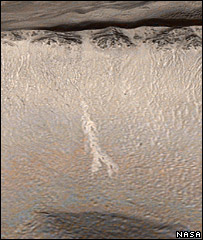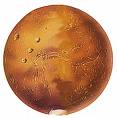Do you think there is life on MARS?
By harshadod
@harshadod (858)
India
December 6, 2006 2:07pm CST
Dramatic new pictures suggest Mars has flowing liquid water on its surface, significantly increasing the chances that there could be life on the Red Planet.
I think there may be life but we have not been able to understand there language or see them.
What do you think?
If there is life, are they more advanced than us?
Will they like to make friendship with us?
http://www.nasa.gov/multimedia/podcasting/jpl-mgs-20061206.html
2 people like this
21 responses
@ESKARENA1 (18260)
•
6 Dec 06
i honestly do not think there is life on mars, however i think at some point there may well have been. The existance of water suggests this is a real possibility
3 people like this
@harshadod (858)
• India
6 Dec 06
Your view may be right b cos if there would have been life at present , we would have got some kind of proof. Let us wait for further research.
2 people like this
@sunnythakkar (293)
• India
7 Dec 06
are you really talking about life on mars??? I would rather pu it this way .... are you really talking about life only on mars ???
Tell me how many solar systems are there in the universe, how many galaxies like the milky way, how far does the universe stretch ... we really don't know. We are probably talking like a frog in a well that thinks that there is nothing outside this well. The well is whole universe.
I dont buy that, I believe that there is surely life on planets other than earth. Its just the matter of when we find it out.
2 people like this
@harshadod (858)
• India
8 Dec 06
Hey thanks for sharing your view. Yes there many many galaxies and we are like a frog in a well.
1 person likes this
@RAMPersona (2033)
• Philippines
13 Dec 06
for now, we can only speculate. even if proven that there wasn't ever life existence on Mars, i believe we humans have the brain the capacity to make a barren place habitable like in the movies, and when situation comes like when our Earth is overly crowded that many of us must move to other places, though not in our lifetime, may be in a distant future.
@harshadod (858)
• India
13 Dec 06
We will probably be forced to colonize the outer space as we get over crowded here. The timing may vary but eventually, as you say, it will happen.

@harshadod (858)
• India
9 Dec 06
What is life without a little bit of imagination. Once upon a time it was imagination that earth is round and today we know it for sure.
Empirical proof is derived over a period of time and the collection of proof depends upon the person involved. Regarding presenting speculations as knowledge, I would say that we are presenting our beliefs and view points, sometimes strongly enough to be misunderstood as knowledge.
This is a debate to unsettle our complacency and think on this subject.
Thanks for your view point.
But you have not answered whether you think there is life on MARS or not?
@agungnugroho (622)
• Indonesia
9 Dec 06
i found this article, written in 2003, about the possibility of life-form existance in mars
Mars Ice is Mostly Water: Good for Biologists, Bad for Terraformers
By Robert Roy Britt
Senior Science Writer
posted: 02:00 pm ET
13 February 2003
The uncovering of an apparent error in atmospheric models of Mars dating back more than three decades suggests that both of the permanently frozen polar caps are made mostly of water ice and contain very little frozen carbon dioxide.
The news is good, in a lukewarm sense, for biologists, who figure water is the key ingredient for any possible life on Mars. It falls short, however, of revealing actual liquid water, which is what even the hardiest known critters need to survive.
The news is rather dismal for "terraformers," who would use the Red Planet's carbon dioxide to engineer a greenhouse effect and turn the cold, dusty little world into a veritable oasis for venturous human colonists.
However it is viewed, the new research helps confirm several other recent studies that have fueled a growing suspicion that Mars contains vast quantities of frozen water.
False impression
Scientists have known since the 1970s that the northern cap of Mars is mostly water ice, but until recently indications were that the southern cap was predominantly if not entirely carbon dioxide, commonly referred to as dry ice. In its gaseous form, carbon dioxide is considered a greenhouse contributor, a substance that naturally helps make up the insulating blanket of atmosphere that keeps Earth cozy and livable.
Caltech planetary science professor Andy Ingersoll and his graduate student, Shane Byrne now say a false impression of Mars ice dates back to 1966, when the first spacecraft to visit the planet determined that its atmosphere was composed chiefly of carbon dioxide.
Researchers at the time figured the ice caps were carbon dioxide, too, and that they interacted with the atmosphere by evaporation and condensation. Subsequently, the Viking spacecraft found that the north polar cap contained water ice beneath a 3-foot (1-meter) sheet of dry ice, and that the upper layer tends to melt away each summer.
The belief persisted that the southern cap was all carbon dioxide.
New evidence is the pits
The seeds of theoretical change came about three years ago with images supplied by the Mars Global Surveyor.
Ingersoll and Byrne examined pictures that Surveyor took of circular pits in south polar ice. The depressions are each 26 feet deep (8 meters) and range in diameter from something akin to a typical sports stadium to more than a half-mile (1,000 meters). The consistent depth had been noted but not adequately explained.
The floors of the pits are flat, and the pits grow 3 to 10 feet (1-3 meters) wider each year as ice melts.
In a telephone interview, Byrne said he and Ingersoll started some time ago working on various computer models to figure out how the pits could widen but not get deeper. Their resulting hypothesis: At 26 feet down is a transition from dry ice to water ice, which would remain solid at much higher temperatures.
Just prior to publishing this new model, new infrared measurements from Odyssey provided "concrete evidence" for the idea, Byrne said, showing that spots in the polar cap corresponding to the floors of the pits are too warm to be made of dry ice and must, therefore, be frozen water.
The scientists conclude that a surface veneer of dry ice hides vast amounts of water ice at the south pole. The southern dry ice sheet is thicker -- corresponding to the depth of the pits -- than in the north and does not entirely disappear during summer.
The study builds on previous examinations of the strange and ubiquitous pits, dubbed "Swiss cheese" upon their discovery in 2000. The following year, another group of researchers suggested that the melting that is causing the pits to grow might indicate profound climate change is underway on Mars. This past December, a study hinted strongly at the south pole's water ice by noting the degree to which surface temperatures change from night to day.
(Separately, the Odyssey probe has also returned compelling evidence for huge stores of water ice at or near the Martian surface and away from the poles.)
No place like home
The apparent lack of dry ice shoots a theoretical hole in the visionary idea of "terraforming" Mars for possible future human habitation. Terraforming involves purposely fueling greenhouse-like conditions to make the planet warmer, wetter and more Earthlike.
The idea straddles a murky line between science fiction and real science, and experts have long argued whether it could ever be accomplished. NASA has, nonetheless, funded studies to consider the possibility. And the notion has many proponents. In its simplest form, terraforming would involve building factories on Mars to convert the planet's raw materials into greenhouse gases, which would warm the atmosphere and in turn melt polar ice, theoretically further raising levels of airborne carbon dioxide."If you wanted to make Mars warm and wet again, you'd need carbon dioxide, but there isn't nearly enough if the polar caps are made of water," Ingersoll said. "Of course, terraforming Mars is wild stuff and is way in the future."Regardless, Ingersoll said, it is questionable whether even a tiny fraction of the necessary carbon dioxide is present on the Red Planet.
That would be good news for people ethically opposed to terraforming, who say humans have no right to alter another planet so significantly and should instead concentrate on maintaining the livability of Earth. Terraforming Mars amounts to making "gods out of geeks," as one critic put it.
The new study, which will be detailed in the Feb. 14 issue of the journal Science, poses other squarely scientific questions with which researchers must now grapple.
Cold and wet
Planetary scientists had assumed that Venus, Earth and Mars all harbored similar levels of carbon dioxide. On Venus, it resides mostly in the atmosphere and caused a "runaway greenhouse effect." Earth's carbon dioxide is largely trapped in marine carbonates.
Mars, now, simply doesn't appear to have much carbon dioxide. That raises the question of how the planet could ever have been warm and wet, a condition often theorized and used to suggest that life might once have been present and could still exist, burrowed these days into the subsurface."It could be that Mars was a cold, wet planet," Byrne said. "Or it could be that the subterranean plumbing would allow for liquid water to be sealed off underneath the surface."The lack of carbon dioxide might play into the hands of geologists who think water has carved the great canyons on Mars and is still forced to the surface now and then. If Mars has very little carbon dioxide, then the canyons could not have been carved exclusively by carbon dioxide floods, as some researchers contest.
Finally, the news is good for future possible crewed science missions to Mars, which would rely on regular ice as a source of drinking water and might even try to convert it into fuel for a return trip.
@gprasad (177)
• India
12 Dec 06
I dont think any other planet in our solar system supports life. Basically the ingredients required for lile to exist is not present in any of the other planets. There as been lot said about life on mars, i think its a very big dream n also it will stay a dream. recreating the atmosphere for a species to survive is very difficult n only nature will be able to do tht, man as no control over it.
@harshadod (858)
• India
11 Dec 06
thanks for your comments. It is difficult to decide what kind of life may be there on MARS.
@psyche_shivya (879)
• India
7 Dec 06
well i'm interested in astronomy since long time, but i know that there's no life on mars, coz there's no air, and well its highly improbable that life's there on mars...
1 person likes this
@harshadod (858)
• India
8 Dec 06
U cannot be sure of whether there is life or not. They may not need to breathe air, but might have developed some evolved ways of respiration. There energy structure might be entirely different. The problem is that we think only keeping a human being in mind.
@bam001 (940)
• United States
15 Dec 06
It seems like you are referring to something along the lines of human life. I think not! Earth is the only planet with such lifeforms. I am not saying that other planets do not have the possibility of some type of life (maybe plant, bacteria...something like that), but not people or animal as we know them.
So, since I certainly do not think there is life on Mars (or any of the other planets --except Earth, of course), There is no language to think about, nor do I have to worry about them being more advanced that we human beings are.
@ndraj_2006 (1422)
• India
10 Dec 06
I guess there would be because, 2 days back the scientists have proves that the mara has water in it. & they have have the pics of the water flown heavily on the surface of mars.
1 person likes this
@harshadod (858)
• India
10 Dec 06
Thanks for sharing your view. The discussion has a photograph of Mars with so called craters created because of water flowing.
We are long way away from establishing that there is or was life on earth, but a step forward has been taken.
@blanksolid (1631)
• Spain
12 Dec 06
Maybe or maybe not. I think that on Mars planet there is something, maybe someday the human being can be found it, have a great day on mylot!
@Tanushree4444 (1275)
• India
7 Dec 06
NO I DON'T THINK THAT THERE IS ANY KIND OF LIFE ON MARS,THE RED PLANET. IF THERE IS THEN SURELY ASTRAUNOTS WOULD HAVE SEEN THEM. THEY SAY THAT THERE EVIDENCES THAT THERE IS SOME KIND OF LIFE ON MARS BUT WHAT I FEEL IS UNLESS AND UNTILL U SEE ANYTHING CONCRETE TO SUPPORT UR VIEWS U CANNOT JUST COME UP WITH A CONCLUSION. BUT IF AND ONLY IF AT ALL THERE ARE LIVES ON MARS AND IF MAN DISCOVERS IT THEN THAT WOULD BE THE GREATEST INVENTIONS/DISCOVERIES IN THE HISTORY OF MANKIND.
1 person likes this
@harshadod (858)
• India
8 Dec 06
We human beings are limited by our senses. Just because we have not seen it doesn't mean that it does not exist.
I also don't know, but the fact that there is evidence of water being present once upon a time on MARS, is a new interesting fact.
@marymaejazmine83 (470)
• Philippines
14 Dec 06
they said that there is life on mars.
1 person likes this
@altair_dip (807)
• India
12 Dec 06
Life other than on earth has always fascinated us.. we have not yet found any conclusive evidence that there is life on any other planet in the solar system... yet we are transmitting signals, sending exploration vehicles to various planets, seeking evidence of life.
The atmosphere of Mars is so thin and the temperature so cold that liquid water cannot persist at the surface. It would rapidly evaporate or freeze. So even if there is life on mars ..Marsians can’t survive on earth….so no Marsians are going to invade Earth :)
1 person likes this
@anouk2005 (177)
• Netherlands
11 Dec 06
I think that if wy can life here
then they can up there and yes maby they are smarther then us en thats why not al people see them and yes maby thewant to makes friends with us but Ithink that maby the tink were fools that are distroying there planet
@kris_cyborg (88)
• India
12 Dec 06
yes there is life on mars i think .......
life may be of any form not only humans....
it can be bacteria or anyother kind which our science doesnt know yet
since there is life on earth there must be life on each and every planet in our galaxy
1 person likes this
@kris_cyborg (88)
• India
12 Dec 06
yes there is life on mars i think .......
life may be of any form not only humans....
it can be bacteria or anyother kind which our science doesnt know yet
since there is life on earth there must be life on each and every planet in our galaxy
1 person likes this





















